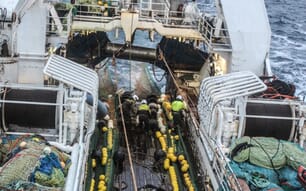The trawl fishery comprises the inshore sector, which targets predominantly shallow water hake (Merluccius capensis) on South Africa’s South Coast, and the offshore sector, which targets mostly deep water hake (M. paradoxus), on fishing grounds extending from the Namibian border southwards along the Alguhas fringe.
The South African hake-directed trawl fishery developed in the early 1900’s and peaked in the early 1970’s. A conservative management strategy since the early 1980’s has led to a gradual recovery in catch rates. Stock rebuilding efforts are ongoing.
Roy Bross, secretary of South African Deep Sea Trawling Industry Association (SADSTIA) said: “Initially we sought certification partly to celebrate the steady, painstaking recovery of domestic hake resources and partly because we wished to pursue a high sustainability standard for the fishery.
We have seen, in the last five years, that MSC certification has other benefits: there is commercial advantage by way of access to other markets and buyers that place a premium on a certified product. Personally, the most gratifying benefit is the way in which certification motivates participants. Certification raises awareness of all fishing stakeholders about the need to adopt best practices with a view to the long term future of the hake resource.”
Hake is by far the most valuable fish resource in South Africa and is marketed locally as hake, cape whiting or haddock (when smoked). It is also exported frozen or chilled to the United Kingdom, France, Spain, Sweden, Switzerland, Italy, Germany, Holland, Australia and the USA. It is marketed as Cape capensis in the USA.
“As the first hake fishery in the world to receive MSC certification, both SADSTIA and the government should be commended for their continued efforts to ensure that this economically important fishery is managed sustainably. There is agreement among stakeholders that certification has already led to a number of improvements, particularly on the ecosystem impacts of the fishery. Continued certification will lead to further improvements and recognition in the market place of the responsible management of this valuable resource”, said Martin Purves, MSC’s Southern Africa Programme Manager.
Since initial MSC certification in 2004 significant progress has been made in addressing many of the impacts of the fishery, as a consequence of the fishery being required to fulfil management plans specifying measurable improvements as part of the certification decision. These include:
- improvements in by-catch management;
- improved understanding of the structure of the stock;
- reduced impacts on the benthic habitat;
- stricter compliance monitoring, and
- significant reductions in the impact of trawling on seabird populations.
Rupert Howes, MSC Chief Executive, added, “The re-certification of the South African hake fishery is a powerful example of how the MSC programme helps contribute to the health of the oceans – it has offered the South African hake fishery a structured framework of incentives to improve the management of stock levels and ecosystem impacts to maintain the long-term future of the fishery. I congratulate the fishery on their hard work in achieving recertification, their ongoing commitment to improvement, and their foresight in supporting the market for sustainable seafood.“



